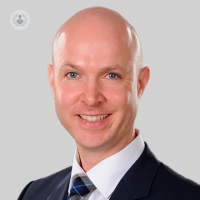What would losing your balance feel like?
Written in association with:Balance in humans is a complex interplay of various inbuilt systems in the body. It enables us to be able to walk down the street in a straight line whilst turning our heads to look in shop windows; we can follow a moving car as it passes, keeping the occupants in focus while we are also moving; and it also allows us to go on fairground rides and recover quickly afterward. This is a big and complex task and we take a lot of it for granted.
Professor Owen Judd, a highly-trained consultant ENT surgeon with a special interest in balance disorders, explains how the body keeps its balance and what a balance disorder would feel like.

How does balance work?
For balance, the brain receives signals and information about the outside world in three main forms: head movement, body posture and vision.
Our vision and awareness of our own body posture make up around 85% of our sense of balance and the remaining 15% comes from our inner ears, which are essentially gyroscopes and movement detectors in the head.
In normal environments the brain receives signals using the visual area around us, the sense of foot and leg position on the ground and the movement and position of our head, all with respect to gravity.
The brain can then process these signals rapidly to detect any changes of movement which could mean we are about to lose our balance and fall. The brain can then almost immediately take aversive action to stop that happening.
What is a balance disorder?
If we have a problem with any one of these three systems we may feel unbalanced or dizzy but can generally compensate for the loss of one input by “overusing” the other two.
If we lose two of these inputs, we decompensate and can feel very dizzy or fall over.
For example:
- Loss of vision – this means we have to be careful as we walk and the proprioceptive signals are increased so our brains know where our feet are.
- Loss of proprioception – this means we cannot detect what position our feet and legs are in and so it’s easier to trip and fall. In this case we are usually very careful and use our vision more to watch for hazards.
- Loss of inner ear function – this means we have to rely far more on our vision to keep us balanced and therefore in the dark, or very busy visual environments, we may struggle more. This is known as “visual preference” as we prefer to use our vision to keep balanced as the inner ear isn’t working.
Generally speaking, visual problems are gradual and the brain compensates well for these. Proprioception can deteriorate slowly as we age but again, the brain adapts. Sudden loss of inner ear function however can make us feel very dizzy and imbalanced.
A balance disorder can therefore refer to a problem with any of these three systems, but in most cases it refers to a problem with the inner ear.
Balance disorders may make us feel generally unbalanced, unsteady or may make us dizzy. Dizziness when we feel the room moving or spinning is called vertigo.
What would having a balance disorder feel like?
Balance disorders can give a number of symptoms:
- Vertigo – described as a “hallucination of movement” - a feeling that you’re moving when your surroundings are still, or that the environment around you is moving, when you are still.
- Dysequilibrium - a feeling of being wobbly and “off balance” or unable to walk in a straight line.
- Movement intolerance - a general dislike of too much movement, such as travel sickness, dislike of fairground rides, sea-travel or fast moving images and busy environments.
- Apprehension to movements – avoiding certain situations to avoid certain tasks for fear of feeling dizzy, such as running down stairs, turning your head quickly, driving or being a passenger in a car, or even going outdoors, to the shops or supermarket.
- Visual preference – the feeling that your balance is worse in situations where your vision needs to be “overused”, such as busy shops and supermarkets, busy streets, patterned wallpaper or carpets. Or if you can’t use your vision easily, such as in bendy corridors, in poorly lit areas or in the dark.
If you feel like you have any of these symptoms and need to see a specialist, don’t hesitate to book a consultation online with Professor Owen Judd and visit him at one of his clinics.


